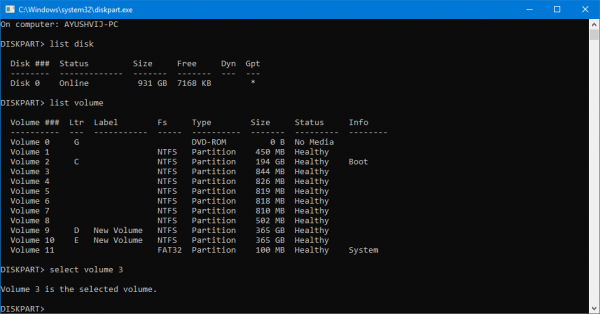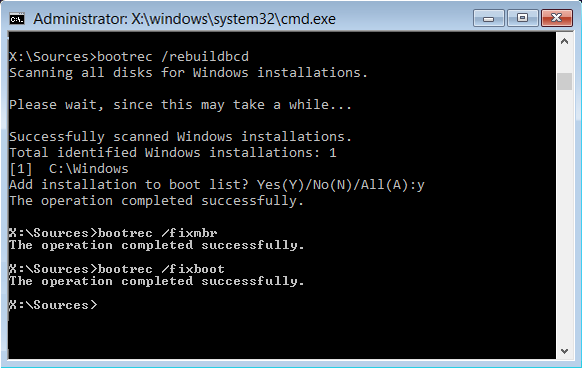The Windows command line is a very useful utility for advanced users. Fixing system files, checking the disk for errors, and many other intensive tasks are made convenient with this. Another task that we carry out with the Command Prompt is to repair the Windows bootup process if it has problems. If when you run the bootrec /fixboot command, you receive an error message Element not found then it could be due to a Damaged BCD or MBR, Inactive system partition or No drive being letter assigned to the EFI Partition.

Today, we will look at how to fix this issue.
Element Not Found error for Bootrec /Fixboot
The following potential fixes will be carried out to fix this Element Not Found error in Windows 11/10:
- Assign Drive Letter to EFI Partition.
- Set the System Partition to Active.
- Repair BCD.
If you create a System Restore point, you can undo any modifications on your computer by performing System Restore.
1] Assign Drive Letter to EFI Partition
Start by pressing WINKEY + X button combo or right-click on the Start button and click on Command Prompt (Admin) or just search for cmd in the Search box, right click on the Command Prompt icon and click on Run as Administrator.
Now, type in the following command-
diskpart
This will start the Diskpart Utility. It is a command-line utility, just like the Command Prompt, but once you invoke it, you will get a UAC Prompt. You have to click on Yes for the UAC Prompt.
Then, type in,
list volume
This will list all the partitions created on your computer. It includes both the types of partitions visible to a normal user in the File Explorer and the ones created by default by Windows to store the boot files and other important system files.

Now you will get a list of the partitions that are made on your computer.
Select the partition that you wish to assign a letter to. You can identify it because its File System (Fs) will be set to FAT32.
Now, type in the following command to select the desired volume-
select volume number
Now, to assign a letter to the volume you just selected, type in the following command-
assign letter=<LETTER>
Replace <LETTER> with the letter that you want to allocate to that partition. This will assign a letter to the volume you just selected.
2] Set the System Partition to Active
You will need to make a bootable Windows USB drive and then boot your computer using it.
When you come to the Welcome Screen to click on Next, and then click on Repair your computer on the bottom left portion of the window. Then click on Troubleshoot > Advanced Options > Command Prompt.
Now, once you have got the Command Prompt window open, execute the following commands one by one in the sequence that they are given-
diskpart
This will start the Diskpart Utility. It is a command-line based utility just like the Command Prompt but will get a UAC Prompt once you invoke it. You have to click on Yes for the UAC Prompt. Then, type in-
list disk
Now select your primary disk by typing in-
select disk number
Now, list all the partitions on the selected disk by typing in the following command,
list partition
This will list all the partitions created on your computer. It includes both the types of partitions visible to a normal user in the File Explorer and the ones created by default by Windows to store the boot files and other important system files.

Now you will get a list of the partitions that are made on your computer.
Type in-
select partition number
to select that partition which is usually around 100 MB in size.
Then type-
active
to mark it active.
Finally, type exit to exit the diskpart utility.
3] Repair BCD

To repair BCD, you will need to make a bootable Windows 10 USB drive and then boot your computer using it.
When you come to the Welcome Screen to click on Next, and then click on Repair your computer on the bottom left portion of the window. Then click on Troubleshoot > Advanced Options > Command Prompt.
Now, once you have got the Command Prompt window open, execute the following commands one by one in the sequence that they are given-
bootrec /fixboot
After that enter the following to rename the BCD file-
ren BCD BCD.bak
Finally, type in the following but replace b: with the letter for your bootable drive that is attached-
bcdboot c:\Windows /l en-us /s b: /f ALL
Wait until the process is done and then restart your computer for the changes to take effect.
This should fix your issues.
See this post if you receive The selected disk is not a fixed MBR disk, The ACTIVE command can only be used on fixed MBR disks message.